At sixes and fives
A passage in that most insidiously influential of histories, 1066 And All That, tries to explain who the Scots, Irish and Picts really were: The Scots (originally Irish, but by now Scotch) were at this time inhabiting Ireland, having driven the Irish (Picts) out of Scotland; while the Picts (originally Scots) were now Irish (living

